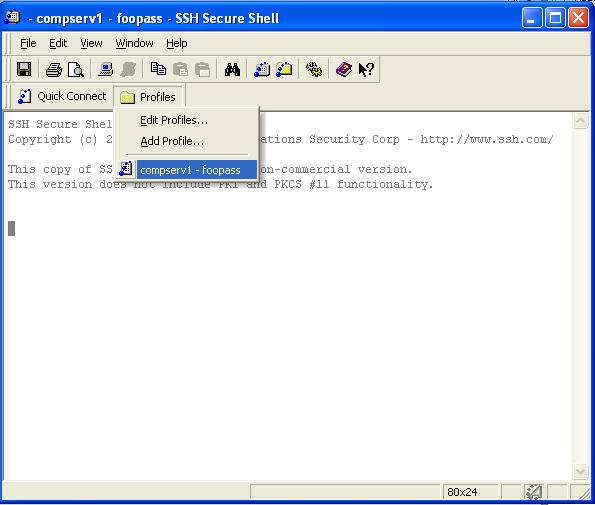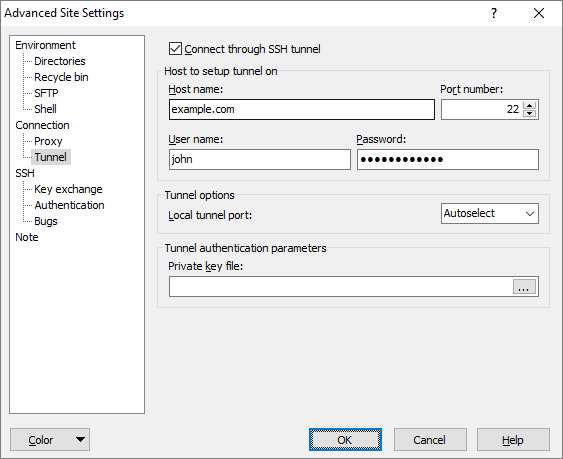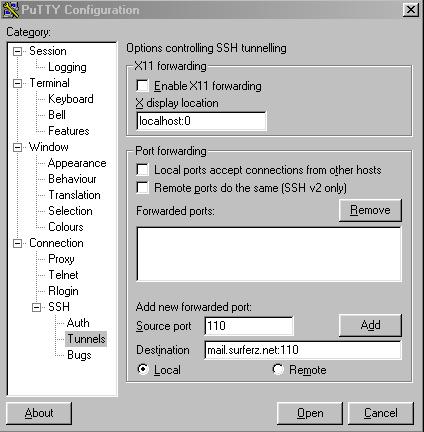
SSH TUNNEL WINSCP PC
$ ssh hop2 # will go from your PC to host2 via host1 (i.e. $ ssh hop1 # will go from your PC to host1 in a single step Host hop1įrom your computer, you can test each jump individually, i.e.

The ProxyJump keyword is used to specify an intermediate host is needed to arrive at the target host. I can use ~/.ssh/config config file which contains the details of each host and all identities needed to access each host on my host PC. If I want to use a single ssh command to go from your PC to any of the hosts. To get to the final computer I may have used multiple ssh commands and the identity files are stored on multiple computers: $ ssh -p 22 -i ~/.ssh/pem/identity1.pem To illustrate this, suppose I needed to get to a destination in 3 hops, and, for each hop, I needed to specify username, host, port, and identity. My answer is really the same as all the other answers here, but, I wanted to clarify the usefulness of ~/.ssh/config and ProxyJump. To access port 8080 on HOSTC via HOSTA and HOSTB: mssh HOSTA HOSTB -L8080:HOSTC:8080 To access HOSTC via HOSTA and HOSTB and use non-default SSH-portnumbers and different users: mssh access HOSTC via HOSTA and HOSTB and use X-forwarding: mssh HOSTA HOSTB HOSTC -X To access HOSTC via HOSTA and HOSTB (same user): mssh HOSTA HOSTB HOSTC $cmd = "ssh $localhost -p $iport -o UserKnownHostsFile=/dev/null -o StrictHostKe圜hecking=no" As a result, the first ssh command keeps the tunnel open until the following two conditions are satisfied: sleep 10 is finished and the tunnel is no longer used.Īfter reading the above and glueing everything together, I've created the following Perl script (save it as mssh in /usr/bin and make it executable): #!/usr/bin/perl Usually, the first ssh command would close after 10 seconds, but during this time, the second ssh command will have established a connection using the tunnel. After closing the private ssh session, I want the ssh tunnel to close, too.Only if this is successful, ssh into the private machine using the tunnel.Establish a tunnel for the ssh protocol (port 22) to the private machine.Ssh -f -L some_port:private_machine:22 "sleep 10" & ssh -p some_port is happening: To automate this procedure, I use the following script: #!/bin/bash If I'm outside and want a remote shell on a machine inside the private network, I would have to ssh into the gateway and from there to the private machine. We have one ssh gateway into our private network. Option 3 is mainly useful to access a service on host2 that is only reachable from host2 itself. If the connection from host1 to host2 needs to be secured, go with option 2. Then a second tunnel is opened from localhost to host2 through the first tunnel. This will open a tunnel from localhost to host1 through which the SSH service on host2 can be used. Tunnel from localhost to host1 and from localhost to host2: ssh -L 9998:host2:22 -N host1 However the port 9999 to host2:1234 can be used by anyone on host1. This will open a tunnel from localhost to host1 and another tunnel from host1 to host2. Tunnel from localhost to host1 and from host1 to host2: ssh -L 9999:localhost:9999 host1 ssh -L 9999:localhost:1234 -N host2 Even Ubuntu as a whole.Tunnel from localhost to host1: ssh -L 9999:host2:1234 -N host1Īs noted above, the connection from host1 to host2 will not be secured.

Please excuse me as I'm a newbie to Ubuntu Server. This is really getting on my nerves and I could do with some help ASAP please. I can connect WinSCP just fine without root but not with root.Īlso it dosen't matter if I'm logged in with Putty at the same time or not.

I connect Putty using my Ubuntu user then doing sudo su. I have openssh-server installed and can connect using Putty just fine. Gone to environment/shell and selected sudo su - in shell dropdown list and left all other settings and stored the site. Gone to WinSCP advanced site settings/environment/SFTP and typed in SFTP Server: sudo /usr/lib/openssh/sftp-server,
SSH TUNNEL WINSCP PASSWORD
Used ssh-keygen to regenerate keys in /root/.ssh.Ĭonfigured WinSCP with my Ubuntu user credentials without password stored and using port 22, And there's no explanation why.Īdded my Ubuntu user to /etc/sudoers together with ALL = (ALL) NOPASSWD: ALL, Now all that happens is I get logged in after putting in my credentials for my Ubuntu user and it says starting session for a split second then it goes back to the login screen.

I've been able to connect to Ubuntu Server 16.04 before as root using SFTP.


 0 kommentar(er)
0 kommentar(er)
